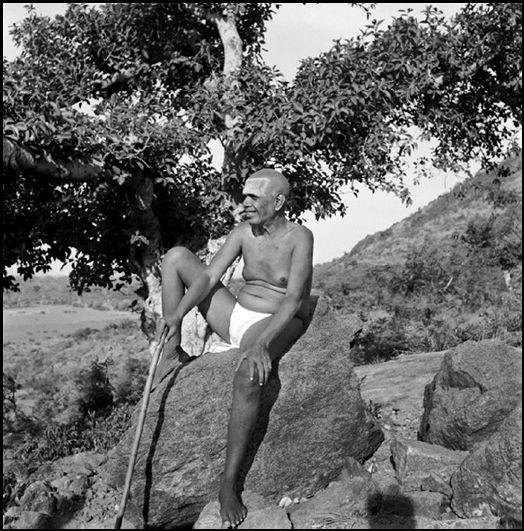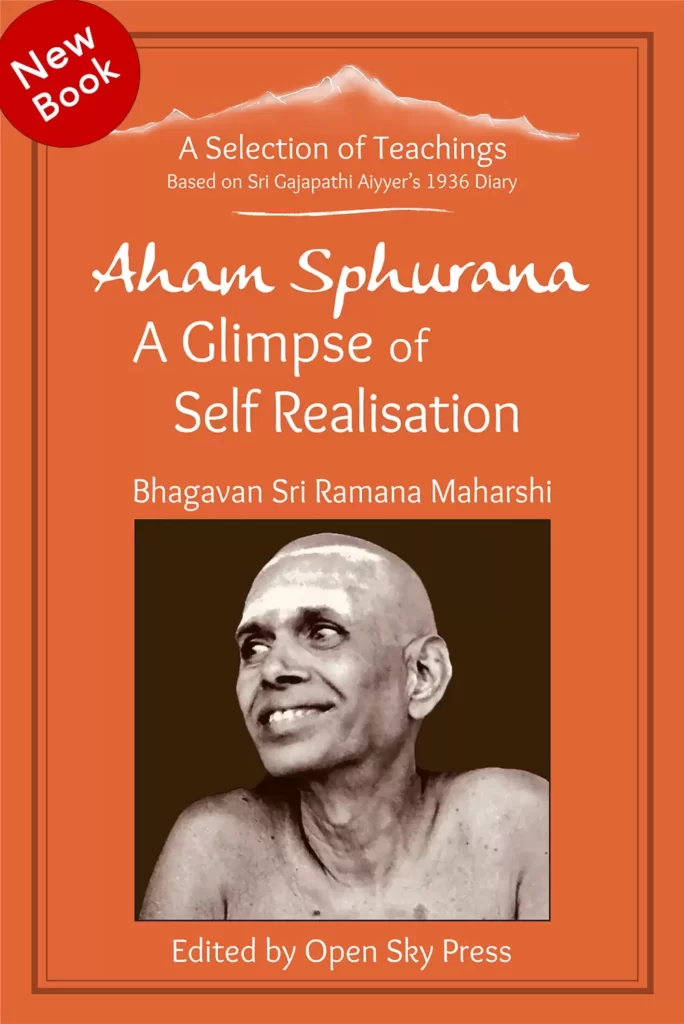
Aham Sphurana
A Glimpse of Self Realisation
New Book about Sri Ramana Maharshi

Available Worldwide
On www.openskypress.com and Amazon:

“In my opinion, Aham Sphurana, a Glimpse of Self Realisation, will become a Treasure Trove of Wisdom to the Seekers of Truth in general, and particularly to the devotees of Bhagavan.”
Swami Hamsananda – Athithi Ashram, Tiruvannamalai
Ramana Maharshi on Destiny
Excerpt from the New Publication “Aham Sphurana”: Ramana Maharshi on Destiny
“Whatever is destined not to happen will not happen, try as you may.
Whatever is destined to happen will happen, do what you may to prevent it.
This is certain. The best course, therefore, is to remain silent.”
Is it true that Bhagavan has said, “If a man is destined not to Realise the Self, no matter what manner of aid or assistance is offered unto him or stands available so as to be plunged into ready deployment by him, he will not Realise the Self. On the other hand, if a man is destined to Realise the Self, no matter what manner of hindrance or trammel is placed across his path or is forced to be encountered by him, he will Realise the Self.”?
B.: The statement is correct.
Q.: Then what is the use of making efforts to Realise the Self?
B.: What gives you the luxury of entitling yourself to believe that you will not Realise the Self?
Q.: Only the commonplace belief that unlikely things are unlikely to happen.
B.: On the other hand, they happen all the time.
Q.: If the Athman has already decided not to permit me to Realise the Self notwithstanding my best, sincere efforts in that direction, what is the point of me making any efforts at all to Realise the Self?
B.: Did the Athman come and tell you that he has made this decision? It is your own ego which pestilentially formulates such infructuous non-issues and then bombards your mind with them, so that you are distracted and thwarted from making efforts to Realise the Self.
In order so that it may safely retain itself from getting destroyed, the ego might manufacture all sorts of excuses to keep you away from abhyasa [practise]; do not believe these deceptive ideas concocted by the ego. Incessantly go on perseverantly and pertinaciously with your efforts to Realise and one day the Self shall Reveal Himself.
Never feel discouraged with lack of progress. The Self—although here and now—cannot be Realised overnight.
Q.: I have many problems in my office and home. They will not allow me to focus on the quest to Realise the Self.
B.: Perception of the problem is the only problem. Since you go on thinking about the problem, the problem grows bigger and bigger. Eventually it becomes unmanageable and drives you mad. Why? Because you keep paying attention to it, because you go on worrying about it.
Q.: Ignoring a problem is no way to solve it.
B.: Neither is thinking about it.
Q.: What Bhagavan is saying makes no sense to me. If a problem has to be solved, a solution must be found. Without thinking, without analysing the problem, how can I devise a solution to it?
B.: Carefully study the problem, in accompaniment with the associated circumstances. That done, keep the mind quiescent in the Shining of the Heart. The solution springs forth or flashes upon mind in an instant–uninvited, of its own accord.
Q.: Is the Bhagavan serious?
B.: Try it and see. Such phenomenon cannot be explained or understood using any theoretical parameters–it has to be experienced.
Q.: Will this, pardon me, crazy approach to solving problems work for all people and all problems?
B.: It works no matter what the problem might happen to be. But it needs a mind which is completely submerged in the Heart and which feels no inclination at all to leave the Heart.
Q.: Then it might not work for the man on the Clapham omnibus.
B.: All their lives people wander about trying to “do” something. One who has seen the futility of the “doing” approach alone recognises the value of the “non-doing” approach; until then he thinks that “doing” is virtuous and righteous and “non-doing” indolent and otiose. It would be erroneous to assume that non-doing is the same as sybaritism.
There is a difference between not doing anything and there not being anybody to do anything. For the Emancipated Soul effort is impossible and so is volition, although you may see his body moving about and doing things.
Q.: Is simply remaining idle the solution to the question of Realisation?
B.: Remaining idle is not the same as keeping the body idle and permitting thought to run riot. The mind must remain without thinking and without falling asleep, but neither effort nor volition must aid it to remain in such state. This alone is actually remaining idle [summayitutthal].
Q.: I cannot even imagine such a state.
B.: The state of summayirutthal cannot be conceived of or imagined or visualised by the mind. All that is possible is to BE it. By means of expenditure of effort or pursuit of desire you cannot reach it; rather, total absence of effort and of volition reveals that you were never different from it. All our effort is only to become perfectly effortless.
Q.: It is said that unselfish, platonic love for fellow man leads to emancipation from samsara. Is this true?
B.: Action performed without harbouring the idea of being the doer thereof helps in effecting purification of mind.
Good and Evil
Q.: Why does God permit evil-minded persons and evil-doers to exist in the world? He is omnipotent, is He not? Should He not get rid of such persons by means a single wave of the hand?
B.: Good and evil are relative terms.
Q.: I am aware of this familiar argument; it is used by philosophers all the time to answer the question of why God permits evil to subsist on in the world. But some persons in this world are downright iniquitous. Will Bhagavan deny the fact?
B.: Let God take care of His creation. You bother about yourself first and foremost. Only evil could ever see evil. Are you perfect? That which is Itself perfect sees perfection and perfection alone everywhere. That which sees imperfection sees so exclusively because it is itself imperfect.
Swami Vivekananda said, “How can you see evil outside, unless it is within you?”. To the Jnani, the world is overflowing with perfection everywhere; all He can possibly see is perfection only. Therefore, know this, Everywhere, in everything, and always: ALL IS WELL.
Q.: What is the purpose of life?
B.: It is to raise this question to oneself and find out the answer for oneself.
Q.: But what is the answer to the question? I acknowledge my inability to fathom out the answer for myself by myself. Thus, I am asking for your help.
B.: The idea that there is a “one” who is experiencing what he calls a “life” is illusory, false, and wrong. Life, which is Absolute Awareness, does not and cannot question the reason for its own existence. There is nothing apart from Life so that such separate component can raise this question. So, really the question does not arise at all.
What is actually Life does not and cannot have such a thing as purpose or objective; it is effortless and volitionless Bliss. But what you evidently mean by “life” is your life. You are asking me the reason for your bodily existence, imagining that the body is yourself.
In effect, thinking that you are identical with the body and thus that you were born, you are asking me why you were born. But is the body “I”? Does it ask, “Excuse me, kind sir, could you please tell me why I happen to exist and why I was born?”? No. Who raises the question then?
Q.: Bhagavan has cleverly transformed my original query into his usual “Who am I?” question!
B.: Any question, if thought about deeply enough, reduces itself into that one single question. You are asking for the purpose of life because you are under the wrong impression that your bodily existence is real. Your question about life pertains to mundane life or the bodily existence because with reference to Absolute Existence the question can never arise: who would be there to ask anything?
So, in asking what the purpose of your life is, you are without doubt asking the reason for your birth. You say unto me: “I was born. Tell me why.” I say unto you: “You were never born. You are the Unborn. Realise It.”. Only if your birth actually did take place do we have to ask why it took place.
Q.: But this body here was born! That is a fact! How can it be denied?!
B.: The body and “I” are not one and the same thing. The body was born and it will perish. “I” was never born, never changes, and never perishes.
Q.: What is the proof that I am not this body? When I am walking under the hot sun, I feel the heat on my skin–not that on anybody else’s. When I swim in a river, I feel the fluidity and coldness of the water on my skin–not that on anybody else’s. How then can I say that this body is not me? Does it not sound silly to say such a thing?
B.: You may have similar sensations in your dreams also. Does that mean your dreams are real?
Q.: Is the world a mere dream, then?
B.: Undoubtedly.
Q.: But you are here! Are we both dreaming the same dream, then? Is it not too much of a coincidence that so many people in this world should be dreaming up the same world precisely–same sun, same moon, same Tiruvannamalai, same Bhagavan, etc., etc.?
B.: Everything, including the other people you mention, is your own mental creation. This is your own dream, through and through.
Q.: Bhagavan who happens to be telling me this now?
B.: Absolutely.
Q.: What proof is available so that I may believe in this explanation?
B.: Were you asked to believe in anything? Keep an open mind. Admitting that it is possible for everything to be unreal or a dream is sufficient to eventually make you see Truth. It needs expenditure of mental effort to even see a world. When all possibility for such expenditure has faded away entirely, there will not remain any world [to exist, see, or be seen]. That is when the Self is Realised.
The World is a Dream
Q.: Does Bhagavan have the ability to make his body invisible?
B.: It is already so.
Q.: Nonsense. I see Bhagavan on the sofa as usual.
B.: I was referring to my own point of view.
Q.: Do Bhagavan’s eyes not see the body sitting on this Sofa here?
B.: These eyes cannot see Bhagawan. Bhagawan is the Deep Beyond.
Q.: I heard that Siddhapurushas possess the ability to make their bodies invisible. Why won’t Bhagavan admit the fact?
B.: The Jnana Siddha has no body. That is his experience.
Q.: But I can see Bhagavan having a body, it is sitting right in front of me, here on this Sofa.
B.: That is the onlooker’s point of view.
Q.: What does Bhagavan’s intellect tell him when his eyes see his body?
B.: These eyes may be open. They do not see anything.
Q.: Is it owing to some defect of vision?
B.: No. It is owing to perfection of vision.
Q.: How can a man with healthy eyes have them open and yet not see anything?
B.: The Jnani is like a new-born infant. Its eyes are open. Yet it does not see anything. It moves about its hands and legs and smiles, but everything is done unknowingly.
Q.: An adult like that would be diagnosed with serious mental retardation.
B.: The Jnani is worse than mentally retarded: He is mentally not present.
Q.: But how then is Bhagavan able to have this conversation with me? To formulate intelligible words and speak them requires a mind.
B.: Some power seems to animate this body and get done whatever job it is that needs to be done. The Jnani Himself would not know anything about it. Relative knowledge needs a mind; i.e. to understand or process relative knowledge, a mind is required.
Q.: So Bhagavan does not know that this conversation is taking place between us?B.: There is no Bhagavan independent of the Self to attend to or know anything.
Q.: I do not understand what is said.
B.: The world and its goings-on are the Self Itself. Therefore the question of the Self being aware of them or unaware cannot arise.
Q.: But usually Bhagavan says that the world is a dream.
B.: From the point of view of the man on the Clapham omnibus, certainly the world is a dream. But from the Jnani’s point of view there can be no such thing as non-Reality. To Him everything is Real: exclusively because He is verily everything.
Q.: Despite the presence of the intellectual understanding that the world is a dream, the mind refuses to stop taking interest in it. Why?
In response to this question, Bhagavan asked Mr. TKS to read out, from a book written by Swami Vivekananda, a certain passage; the following was read out to the Hall – Once upon a time, Indra was, as usual, flying through the sky seated on his heavenly chariot. As he was surveying the earth, he caught sight of a few domesticated pigs wallowing in human excreta; some of them were feeding upon it. Indra was nauseated with revulsion upon having beheld the sight. He asked Narada, who was by his side, why the pigs could not be reformed and taught to behave better.
Narada replied that it was in the inexorable nature of a pig to behave so. Indra, however, was not convinced. He asked, “Do you mean, then, to say that if I were to take birth as a pig, I would behave like this?”. Narada merely smiled and did not say anything. However, not liking the mischievous glint in Narada’s eyes when that smile was in attendance upon his lips, Indra said, “Very well. I shall demonstrate to you my greatness. Presently I am going to transform into a pig, and you shall see for yourself how elegantly dignified my behaviour shall be…”.
Narada tried to dissuade him, but could not succeed in trying to stop him. Indra descended on the earth, and asked Narada to see for himself what was going to happen. Indra was now in the shape of a hefty pig. He went hither and thither, and tried to keep a distance from the other pigs roaming about the region, which were spattered with human ordure whilst remaining engrossed in the act of consuming it with relish. Indra felt the experience of being a pig to be so relaxing that he dismissed the chariot, and told Narada he would like to stay in this form for a few more hours. Laughing, since he guessed what was about to happen, Narada bade Indra farewell and departed to his own realm.
Indra was now captivated by the sight of a female pig, which was covered with excreta all over. He tried to make love to the pig, but she would not consent to be approached, because he looked and smelled different from the other pigs. Indra was wondering what to do. A few hours passed, and he felt hungry and absent-mindedly chewed at something that was lying near his feet; after swallowing it with relish, the thought dimly occurred to him that he had just consumed a particularly foul-smelling turd.
Vaguely he recollected that the act of pigs consuming excreta was something he had once borne an aversion to. Now that he was smeared with excreta, the female pig, finding him an acclimatised sight, was more interested in reciprocating his lustful advances. The pigs made passionate love to each other, and they happily wallowed upon the slushy ground in the frenzied ecstasy of coital exhilaration, covered all over with the faeces of humans and animals. In the days of frolicsome, aggressive love-making that followed, Indra had completely forgotten who he was. Soon the she-pig was pregnant, and a lot of baby pigs were born; and the couple was very happy.
Then some gods saw his plight, and came to him, and told him, “You are the king of the gods, you have all the gods under your command. Why are you here?”. But Indra said, “Never mind; I am all right here; I do not care for heaven, while I have this sow and these little pigs.”. The poor gods were at their wits’ end. After a time they decided to slay all the baby pigs one after another. When all were dead, Indra began to weep and mourn.
Then the gods ripped his pig-body open and he came out of it, and began to laugh, when he realised what a hideous, nightmarish experience he had had–he, the king of the gods, to have become a pig, and to have deluded himself into believing that that pig-life was the only life; and not only that but also to have wanted the whole universe to come into the pig-life!
What is the moral of the story?
The Purusha, when it identifies itself with Prakriti, forgets that it is pure and infinite. The Purusha does not love, It is love itself; it does not exist, It is existence itself; it does not know, It is knowledge itself. It is a mistake to say the Athman loves, exists, or knows. Love, existence, and knowledge are not the qualities of the Purusha, but its essence. When the Purusha associates with Prakriti, the resultant ego is characterised by the appearance of having become so degenerate that if you approach it to communicate unto it “You are not a pig; your true nature is one of Infinite and Eternal Glory.”, it begins to aggressively squeal and bite.
B.: Mere intellectual understanding of the precepts enunciated by the doctrine of Ajata Advaita [ ] is not of any great use. Practise of mental introversion is necessary to scorch the vasanas and eventually destroy them altogether. Complete destruction of vasanas is the same as Realisation.
Edited by John David Oct 2021

Aham Sphurana
A Glimpse of Self Realisation
New Book about Sri Ramana Maharshi

Available Worldwide
On www.openskypress.com and Amazon:

“In my opinion, Aham Sphurana, a Glimpse of Self Realisation, will become a Treasure Trove of Wisdom to the Seekers of Truth in general, and particularly to the devotees of Bhagavan.”
Swami Hamsananda – Athithi Ashram, Tiruvannamalai






